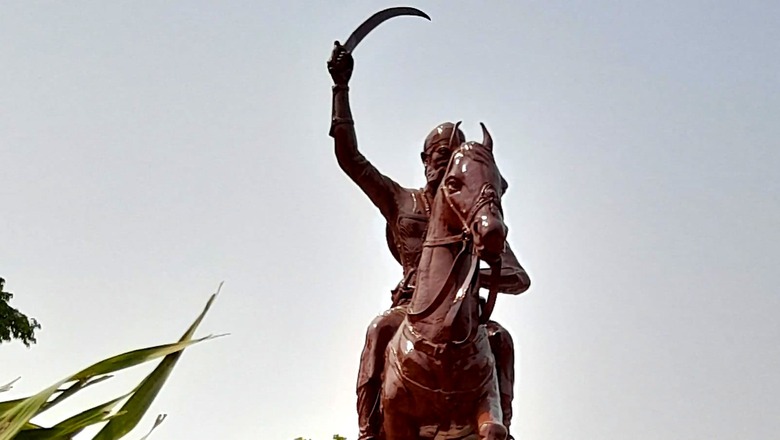
views
The Bharatiya Janata Party is celebrating Babu Veer Kunwar Singh, who had led a battery of mutineers against the East India Company during the first freedom struggle of 1857 in Bihar and parts of Uttar Pradesh.
As part of the Centre’s Azadi Ka Amrit Mahotsav celebrations, union home minister Amit Shah will be leading the largest-ever contingent of BJP volunteers, who will collectively wave 75,000 Indian flags in Bihar’s Ara city to make a Guinness World Record on Saturday.
Ara has a sizeable chunk of Rajput voters, and Veer Kunwar Singh is considered to be a hero in this area for his act of valour against the British during the 1857 war.
Previously, the Bihar government used to celebrate Kunwar Singh’s victory over the English rulers, but this time the BJP is going all out to make the Rajput leader’s birth anniversary a grand event.
Chief minister Nitish Kumar and his party Janata Dal (United)’s MLAs aren’t part of this gala celebration, as the BJP does want to make a political statement with this event.
‘My hero, my celebration’
On April 8, Nitish Kumar celebrated the birth anniversary of Ashoka the Great, who supposedly ruled areas over three times larger than present-day India.
Though during Emperor Ashoka’s time, caste identity was not really prevalent, political leaders claim that he belonged to the Kushwaha caste.
The Kushwaha leaders from the BJP were also not to be left behind, as they celebrated Ashoka’s birth anniversary on different platforms.
There were a lot of allegations and counter-allegations in the run-up to the celebrations as both the JD(U) and BJP tried to usurp the legacy of the great king, who ruled India between 268 and 232 BCE.
Minister of states for home Nityanand Rai says that Babu Veer Kunwar Singh had registered a grand victory on April 23, 1858, against the East India Company, and that’s why his government is celebrating the event. One must not read too much into this, he said.
“We want a new generation to know about the exploits of Babu Veer Kunwar Singh and nothing else,” said BJP state president Sanjay Jaiswal.
Congress leaders in Bihar warned the BJP against making Babu Veer Kunwar Singh a leader of a particular caste as he fought for the country and people from all religions and castes were part of his army.
He picked up the sword when many were giving up
For the benefit of history enthusiasts, when Babu Veer Kunwar Singh held the sword in his hand, he was 80 years old. At the time, the 80-year-old last Mughal emperor Bahadur Shah Zafar was writing letters with trembling hands, urging the native kings to participate in the first war of independence.
Displaying Rajput pride, Veer Kunwar Singh was preparing all the countrymen for sacrifice in the face of war, which was imminent.
As was expected, the war ensued, and Babu Veer Kunwar Singh led the forces from Ara with accuracy and effectiveness and defeated the East India Company troops many times.
After revolts at Meerut, Delhi and other parts of the country, commissioner William Tayler started disarming the Indian soldiers, which agitated both Hindus and Muslims.
Sepoys of Danapur cantonment found a natural leader
The three platoons from Danapur cantonment threw an open challenge to the British rulers and sided with Babu Veer Kunwar Singh on July 24, 1857, accepting him as their natural leader.
As soon as the revolutionary army of Danapur reached Jagdishpur, Kunwar Singh left his palace in Jagdishpur and assumed the leadership of the forces. In a similar fashion, Mughal emperor Bahadur Shah Zafar had led two thousand cavalry soldiers from Meerut on May 11, 1857.
Kunwar Singh took no time to demolish the British offices by releasing the prisoners from jail and forcing the British and Sikh armies to lay down their arms.
Babu Veer Kunwar Singh became the universal leader of 5,000 revolutionary soldiers of the national independence movement and won the hearts of all Bhojpuri-speaking people.
The public gave him the title of ‘Tegwa Bahadur’.
For the British, the city of Ara was a very important place from a military point of view. They wanted to save it at all costs.
Kunwar Singh offers his left hand to River Ganga
Captain Charles Dunbar, accompanied by a contingent of 500 European white soldiers and Sikhs, left for Ara on July 29, 1857, from the Danapur Cantonment to save the lives of the British surrounded in Ara House.
His army fought valiantly against Babu Kunwar Singh’s troops the night before reaching Ara, in which 50 out of 500 soldiers were injured and only three surviving officers reached Danapur. All the other soldiers including Captain Dunbar were killed.
After the death of the Captain, the whole of the Shahabad area became independent. However, this victory was short-lived as Major Vincent Eyre reclaimed the town of Ara on August 3, 1857.
During the fight, a bullet hit Kunwar Singh’s wrist. He cut off his left arm and offered it to ‘Maa Ganga’.
He died on April 26, 1858, but he became a part of the folklore in Bihar.
This is the time when his exploits should have reached much beyond Bihar and Bhojpur area. And it equally holds true that great freedom fighters like Babu Veer Kunwar Singh must be kept above narrow political debates.
Read all the Latest Politics News here

















Comments
0 comment